Prof. Ronghuai Huang delivered a speech on the global summit ‘Together United Online’ organized by Huawei
date:2020-04-10 20:21author:adminsource:Smart Learning Instituteviews:
In the spring of 2020, the world is fighting against the rampant COVID-19 pandemic. All nations are closely cooperating with each other. In this fight against the pandemic, science and technology are playing an active role. Huawei organized the global summit, named ‘Together United Online’, on April 7th - 9th, 2020, inviting the medical, transportation, and education industry practitioners to share their experience with our global peers. Use science and technology to boost global confidence and contribute to the pandemic prevention and control.
 On April 9th, Prof. Ronghuai Huang, Co-Dean of Smart Learning Institute of Beijing Normal University (SLIBNU), Director of UNESCO International Research and Training Center for Rural Education (INRULED), delivered a speech about Facilitating Flexible Learning during COVID-19 Outbreak in China, on the education session of this global summit.
On April 9th, Prof. Ronghuai Huang, Co-Dean of Smart Learning Institute of Beijing Normal University (SLIBNU), Director of UNESCO International Research and Training Center for Rural Education (INRULED), delivered a speech about Facilitating Flexible Learning during COVID-19 Outbreak in China, on the education session of this global summit.
Firstly, Prof. Huang introduced the quick response and main action plans from Ministry of Education, PRC, which ensure the students’ safety and keep their home study. For example, on early February, MOE has launched the Disrupted Classes, Undisrupted Learning initiative, providing flexible online learning to over 270 million students. Meanwhile, MOE issued a new policy document on mobilizing ICT infrastructure, learning platform, digital resources and human resources from government, institutions and private sectors to support online education during educational disruption.
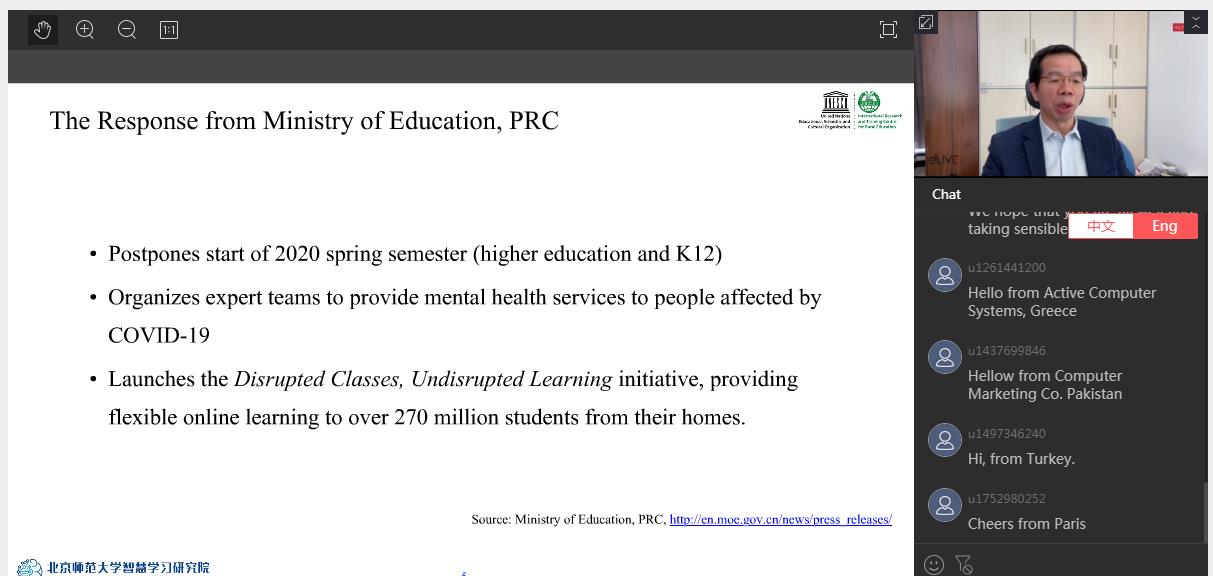 The educational disruption this time actually is the largest practice online learning with a huge scale, providing flexible learning, content on demand, and open educational resources. Also, we need government leading, school-based management, school-family collaboration, and all society involved.
The educational disruption this time actually is the largest practice online learning with a huge scale, providing flexible learning, content on demand, and open educational resources. Also, we need government leading, school-based management, school-family collaboration, and all society involved.
Furthermore, he explained that flexible pedagogy focused on a learner-centered educational strategy, and promoted 3E learning (easy learning, engaged learning and effective learning).
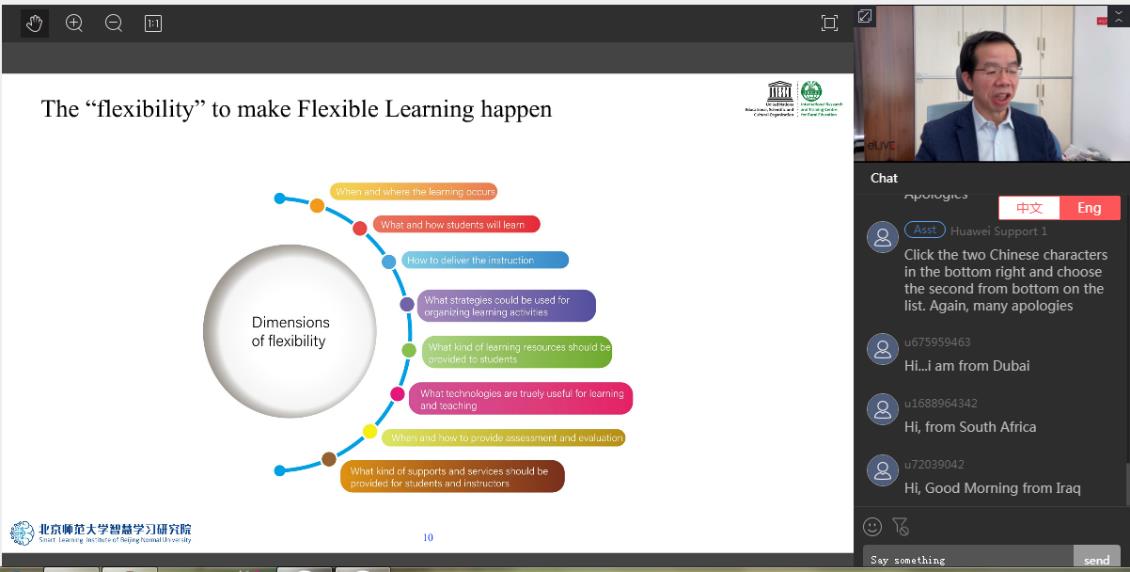 So, how to facilitate flexible learning in a large scale? Prof. Huang concluded the following seven core elements of effective online education in emergencies, based Chines practices and experiences:
So, how to facilitate flexible learning in a large scale? Prof. Huang concluded the following seven core elements of effective online education in emergencies, based Chines practices and experiences:
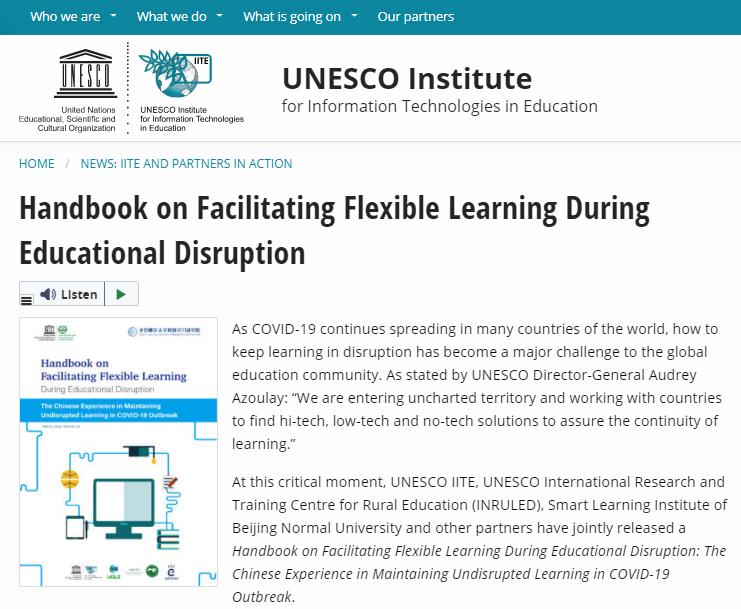 Besides, other speakers also shared their experience on how to maintain continuity of learning during school closures, with the help of ICT.
Besides, other speakers also shared their experience on how to maintain continuity of learning during school closures, with the help of ICT.
Mr. Chen Qingtao, Director of Informatization and Science and Technology Dept, Longhua Institute of Education Sciences (Shenzhen), introduced Longhua Cloud School, which is a digital twin of the Longhua School. The Cloud School advocates a mixed learning mode of ‘cloud-based learning + hands-on practices’, supports multi-scenario and multi-state teaching practices, and meets home learning requirements in this difficult time.
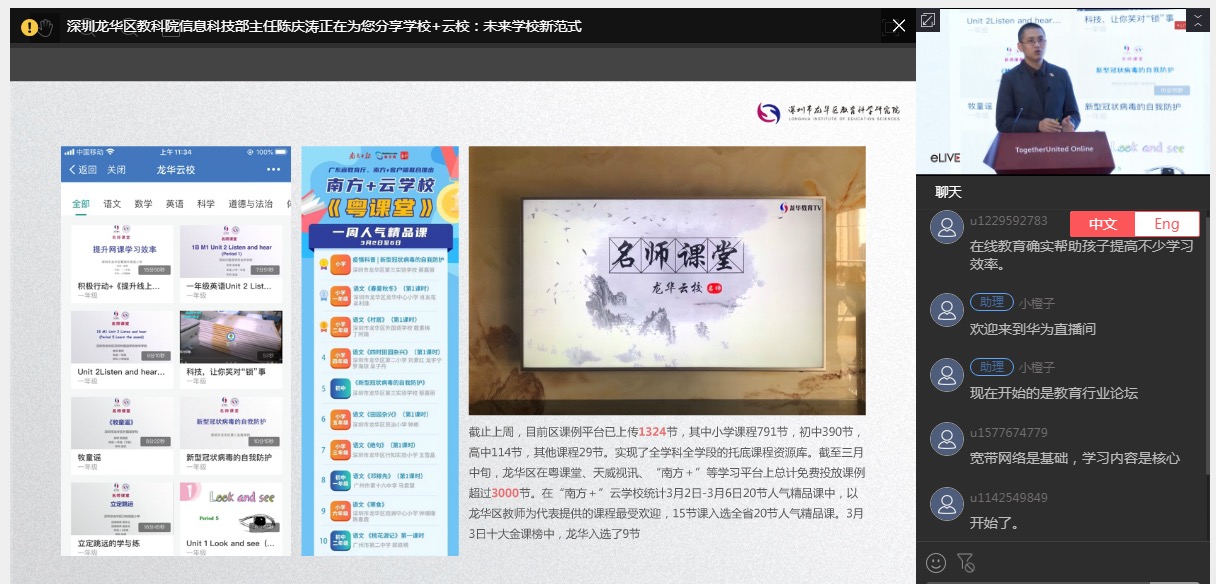 Ms. Christina Ng Siok Har, GM and Director of ULearning Technology (International) Pte. Ltd, said online or live broadcast teaching was not about putting physical classroom teaching content to online. Deploy intelligent educational technology to conduct online teaching activities that can get students engaged and responded in real-time with the data of the entire session instantly available and analyzed. Teachers are then able to enhance teaching efficacy continuously with the constantly updated data analytics.
Ms. Christina Ng Siok Har, GM and Director of ULearning Technology (International) Pte. Ltd, said online or live broadcast teaching was not about putting physical classroom teaching content to online. Deploy intelligent educational technology to conduct online teaching activities that can get students engaged and responded in real-time with the data of the entire session instantly available and analyzed. Teachers are then able to enhance teaching efficacy continuously with the constantly updated data analytics.
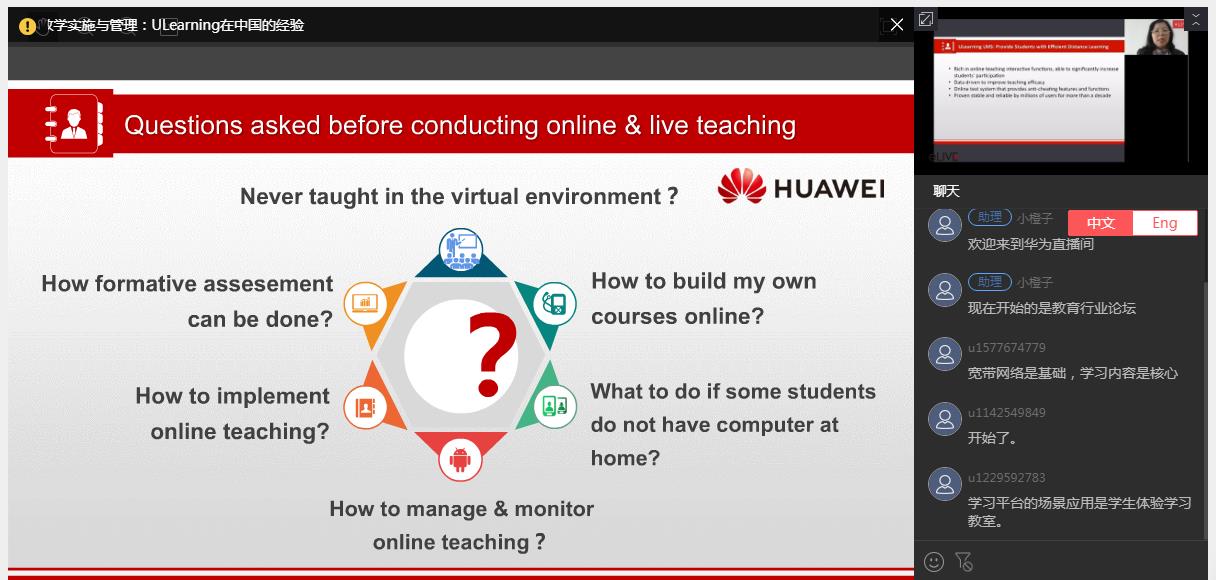 Mr. Anthony Xu, President of the Education Industry of the Government and Public Sector Business Unit, Huawei Enterprise BG, introduced that Huawei integrated key technologies such as 5G,WIFI-6, cloud, and AI and worked with partners to provide smart education solutions, facilitating education informatization and achieving education equality, during the comprehensive digital transformation of the education industry.
Mr. Anthony Xu, President of the Education Industry of the Government and Public Sector Business Unit, Huawei Enterprise BG, introduced that Huawei integrated key technologies such as 5G,WIFI-6, cloud, and AI and worked with partners to provide smart education solutions, facilitating education informatization and achieving education equality, during the comprehensive digital transformation of the education industry.
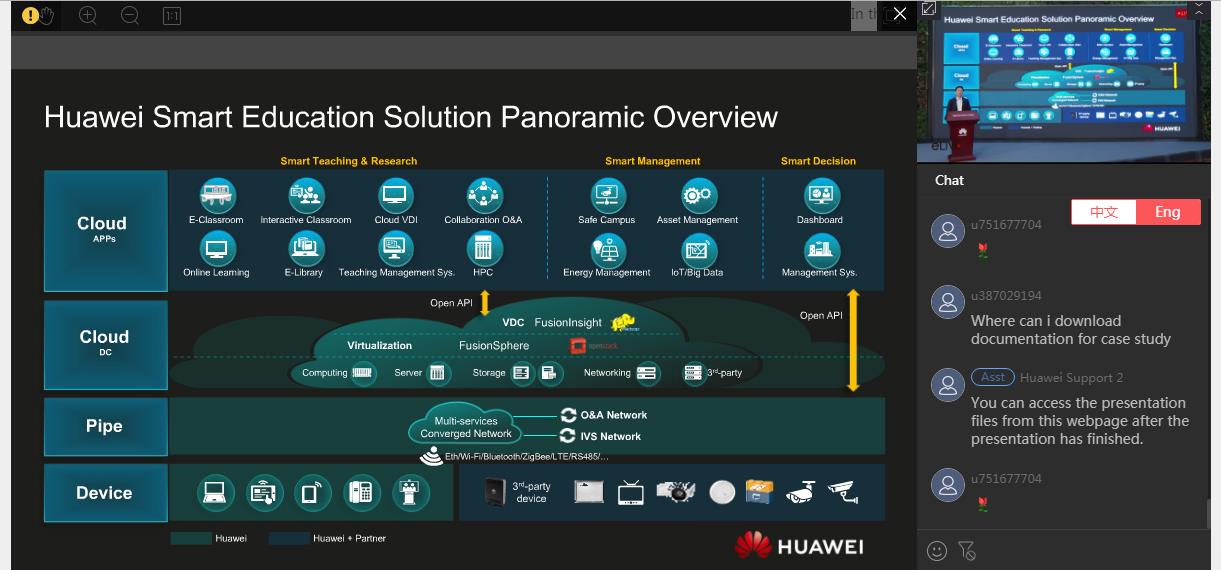

Firstly, Prof. Huang introduced the quick response and main action plans from Ministry of Education, PRC, which ensure the students’ safety and keep their home study. For example, on early February, MOE has launched the Disrupted Classes, Undisrupted Learning initiative, providing flexible online learning to over 270 million students. Meanwhile, MOE issued a new policy document on mobilizing ICT infrastructure, learning platform, digital resources and human resources from government, institutions and private sectors to support online education during educational disruption.

Furthermore, he explained that flexible pedagogy focused on a learner-centered educational strategy, and promoted 3E learning (easy learning, engaged learning and effective learning).

- Ensuring reliable network infrastructure;
- Using friendly learning tools;
- Providing interactive suitable digital learning resources;
- Guiding learners to apply effective learning methods;
- Promoting effective methods to organize instruction;
- Providing instant support services for teachers and learners;
- Empowering the partnership between governments, enterprises, and schools.
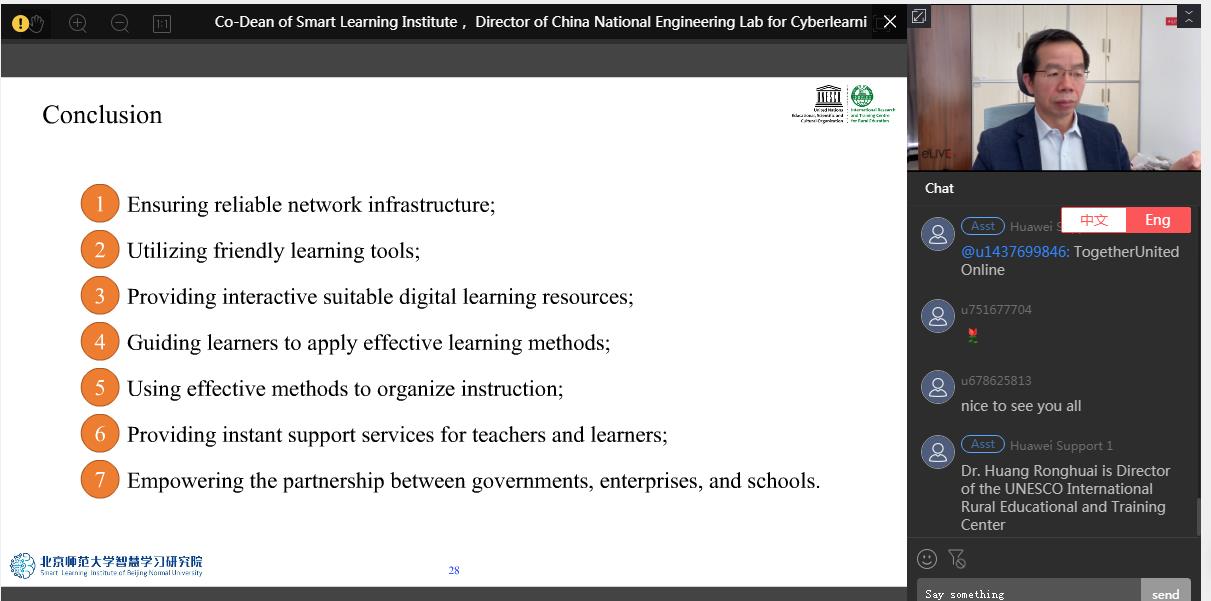
Finally, he said, as the response to the initiative of Disrupted Classes, Undisrupted Learning, SLIBNU, UNESCO IITE (Institute for Information Technologies in Education) and UNESCO INRULED jointly released a handbook on March 16th, named Handbook on Facilitating Flexible Learning During Educational Disruption, focusing on Chinese experience in maintaining undisrupted learning in COVID-19. (URL for downloading: http://sli.bnu.edu.cn/en/Download/Promotional/Research_Report/2020/0315/901.html)

Mr. Chen Qingtao, Director of Informatization and Science and Technology Dept, Longhua Institute of Education Sciences (Shenzhen), introduced Longhua Cloud School, which is a digital twin of the Longhua School. The Cloud School advocates a mixed learning mode of ‘cloud-based learning + hands-on practices’, supports multi-scenario and multi-state teaching practices, and meets home learning requirements in this difficult time.




